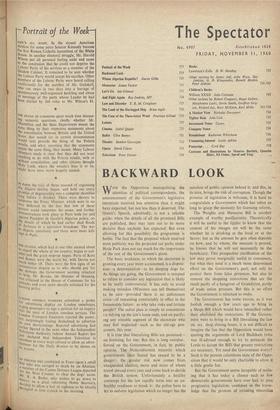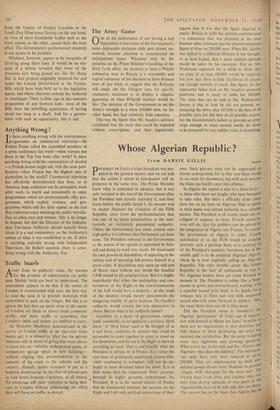BACKWARD LOOK
ITH the Opposition monopolising the V V attention of political correspondents, the announcement of the Government's legislative intentions received less attention than it might have expected; but not less than it deserved. The Queen's Speech, admittedly, is not a reliable guide; when the details of all the promised Bills are published, they may turn out to be more decisive than anybody has expected. But even allowing for this possibility the programme is feeble. The fact that the proposal which received most publicity was the projected car parks under Hyde Park does not say much for the importance of the rest of the Government's plans.
The basic weakness, to which the electorate is growing every year more accustomed, is a disposi- tion—a determination—to let sleeping dogs lie. As things are going, the Government is tempted to refuse to consider any legislation that is likely to be really controversial. It has only to avoid making mistakes (Ministers can tell themselves) to be sure—provided there is no unforeseen crisis—of remaining comfortably in office in the foreseeable future: so why take risks and irritate people? The safest plan is simply to concentrate on tidying up the law's loose ends, and on pacify- ing any sizeable segment of the electorate who may feel neglected—such as the old-age pen- sioners, this year.
It is true that liberalising Bills are promised— on licensing, for one. But this is long overdue: forced on the Government, in fact, by public opinion. The Nonconformist minority which governments once feared has ceased to be a danger: the greater risk now comes from exasperated electors, more and more of whom travel abroad every year and come back to deride the British system. Unfortunately a healthy contempt for the law rapidly turns into an un- healthy readiness to break it: the police have to try to enforce legislation which no longer has the sanction of public opinion behind it; and this, in its turn, brings the risk of corruption. Though the promise of legislation is welcome, it is hard to congratulate a Government which has taken so long to grasp the necessity for licensing reform.
The Weights and Measures Bill is another example of worthy pusillanimity. Theoretically it will be useful to the tippler to know that the content of his meagre tot will be the same whether he is drinking at the local or at the Savoy; but as the amount he gets often depends on how, and by whom, the measure is poured, he knows that he will not necessarily be the beneficiary. This prospective clarification of the law may prove marginally useful to consumers, but what they need is a much more determined effort on the Government's part; not only to protect them from false pretences, but also to remove the shopping restrictions that are the . result partly of a hangover of Grundyism, partly of trade union pressure. But this is an effort the Government is reluctant to make.
The Government has some excuse, as it was foolish enough a few years ago to bring in a Shops Bill which would have intensified rather than abolished the restrictions. If the Govern- ment were to bring in a Bill liberalising the law on, say, shop closing hours, it is not difficult to imagine the fun that the Opposition would have quoting the arguments of Lord Hailsham (who was ill-advised enough to try to persuade the Lords to accept the Bill) that greater restrictions are necessary. Yet need the Government worry? Such is the present calamitous state of the Oppo- sition that it would be only charitable to allow it a little gentle fun.
But the Government seems incapable of realis- ing that it has today a chance such as few democratic governments have ever had, to pass progressive legislation, confident in the know- ledge that the protests of irritating minorities from the League of Empire Loyalists to the Lord's Day Observance Society, on the one hand, or even of more formidable bodies such as the trade unions on the other, cannot haiie the least effect. The Government's parliamentary majority is too secure to be troubled.
Ministers, however, appear to be incapable of thinking along these lines. It would be no sur- prise if a debate revealed that some of the measures now being passed are, like the Shops Bill, in fact projects originally prepared for and under the Labour Government in the Forties; Bills which have been held up in the legislative queue, and whose character nobody has bothered to investigate. There is little sign in this session's programme of any forward look: most of the Bills have the snivelling appearance of having stood too long in a draft. And for a govern- ment with such an opportunity, this is sad.















































 Previous page
Previous page